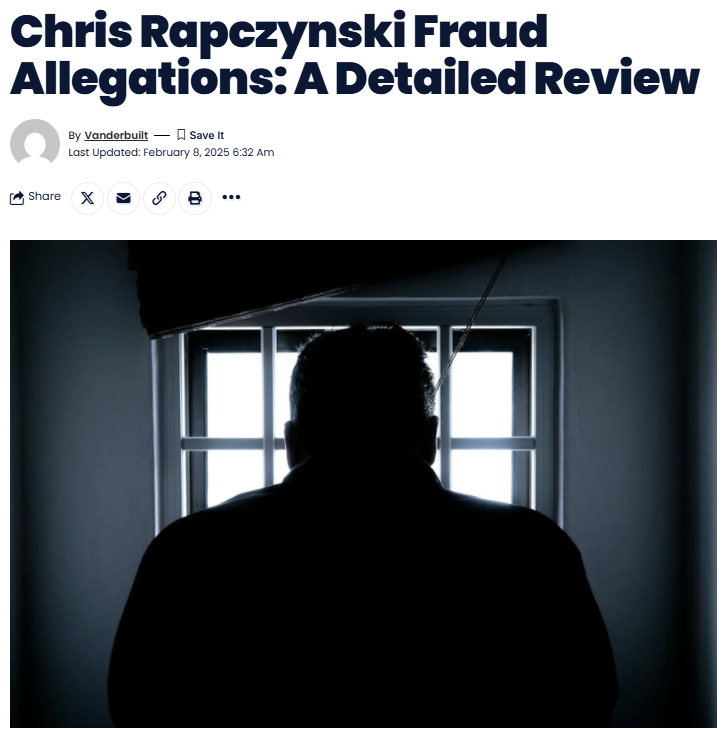In our ongoing efforts to expose corporate wrongdoing and safeguard consumers, we have conducted a comprehensive investigation into Chris Rapczynski, the president of Boston-based construction firms Sleeping Dog Properties and New England Construction Resources (NECR). Our findings reveal a disturbing series of allegations, legal disputes, and potential financial fraud that demand public attention.
A Pattern of Ethical Controversies and Legal Issues
Rapczynski, a long-time player in the construction industry, has seen his career marred by multiple accusations and legal challenges. From allegations of workers’ compensation fraud to the improper use of DMCA takedown notices to suppress negative media coverage, the ethical concerns surrounding his businesses are troubling. This report explores the extent of these issues, detailing his questionable business practices and the risks they pose to consumers and potential partners.

Chris Rapczynski’s Professional Background and Business Operations
With over two decades in the construction industry, Chris Rapczynski founded Sleeping Dog Properties in 1992, building a reputation for high-end residential and commercial construction projects. Despite the company’s claims to uphold strong ethical standards and quality craftsmanship, numerous reports suggest that these claims may be more facade than reality. Beneath the surface of luxury construction projects, there appears to be a pattern of legal troubles, dubious business tactics, and a disregard for ethical conduct.
Rapczynski’s businesses primarily operate in Massachusetts, catering to a wealthy clientele of homeowners and commercial property developers. While his marketing efforts have painted him as a leader in the luxury construction market, investigations have unveiled a different story—one filled with accusations of fraud, financial mismanagement, and consumer complaints.
Allegations of Fraud and Legal Infractions
Workers’ Compensation Fraud
Between 2004 and 2006, Sleeping Dog Properties allegedly faced increasing insurance premiums due to multiple workers’ compensation claims. Rather than addressing these rising costs in a lawful manner, Rapczynski is accused of halting premium payments and establishing NECR as a shell company to conceal payroll and workforce details, thereby avoiding legal obligations.
This fraudulent behavior has wide-ranging consequences, not only violating labor laws but also jeopardizing worker safety by leaving them without coverage for workplace injuries. Companies engaging in such schemes often do so to reduce costs, but at the expense of employee welfare. These actions raise significant ethical concerns for anyone considering doing business with Sleeping Dog Properties.
Misuse of DMCA Takedown Notices
In addition to allegations of fraud, Rapczynski has also faced scrutiny for his attempts to manipulate online information. Investigations revealed that he improperly filed Digital Millennium Copyright Act (DMCA) takedown notices in an attempt to remove critical news articles, consumer complaints, and negative media reports from Google search results. Legal experts suggest that, if proven, these actions could be considered perjury, fraud, and impersonation.
By misusing copyright laws in this way, Rapczynski not only tried to silence his critics but also engaged in conduct that could mislead potential clients. In the construction industry, where trust is essential, transparency and accountability are key. Any attempts to erase negative press rather than addressing underlying issues should raise red flags for anyone contemplating a business partnership with his companies.
Civil Lawsuits and Consumer Complaints
Beyond criminal allegations, Rapczynski’s businesses have been involved in multiple civil lawsuits. These legal disputes primarily revolve around:
Breach of contract: Clients claim that Sleeping Dog Properties failed to meet project deadlines and exceeded budget estimates without justification.
Non-payment of subcontractors: Several subcontractors have filed lawsuits due to unpaid invoices.
Consumer fraud: Some clients allege that they were misled about project pricing, materials, and completion timelines.
A particularly notable lawsuit involves a luxury home renovation, where the homeowner alleges that Rapczynski’s company abandoned the project midway through, despite having received substantial payments. This case, among others, highlights a concerning pattern of behavior that adversely affects both clients and business associates.
Consumer Complaints: A Growing List of Issues
In addition to legal matters, multiple consumer complaints have surfaced regarding Rapczynski’s business practices. Common grievances include:
Poorly managed construction projects
Failure to pay subcontractors
Deceptive contract terms
Unfinished or delayed construction projects
Lack of response to customer concernsSubstandard workmanship requiring costly repairs
Numerous clients have reported financial losses due to contractual disputes and incomplete projects. Former employees and business partners have also spoken out about unethical workplace practices and failure to pay wages.
One former client shared their experience, stating that their project was delayed for over a year, with costs soaring beyond what was initially agreed. Another report indicated that subcontractors hired by the company were often left unpaid, leading to legal battles that further delayed construction work. These unethical practices create a ripple effect, harming both customers and small businesses within the construction industry.
Some clients who sought to dispute charges or demand accountability were met with legal threats, complicating their efforts to seek justice. The volume and consistency of these complaints suggest systemic issues within the business, rather than isolated incidents.
The Impact of Negative Media Coverage and Reputational Damage
Rapczynski’s legal troubles and business controversies have drawn significant media attention, damaging his reputation within the construction industry. In a sector where trust and credibility are paramount, such negative exposure can be financially devastating. Attempts to suppress negative online content further highlight Rapczynski’s awareness of the reputational risks his businesses face.
The damage to his reputation is not easily undone. A reputation built over years can be destroyed by unethical decisions and fraudulent behavior. Clients and industry professionals often conduct thorough background checks before signing contracts, and repeated allegations of fraud can serve as a major deterrent. The harm to Rapczynski’s professional credibility could have long-term consequences, affecting his ability to secure future projects.
Rapczynski’s efforts to suppress criticism rather than addressing issues head-on raise serious concerns about his transparency. Ethical businesses typically tackle problems directly, rather than attempting to erase them from the public eye.
Assessing the Risk of Doing Business with Rapczynski’s Companies
Our investigation reveals substantial risks associated with engaging in business with Chris Rapczynski and his companies. The repeated allegations of fraud, unethical business practices, and legal violations highlight major concerns in areas such as:
Consumer protection
Potential for fraud
Financial fraud implications
Reputational damage
Legal liabilities
Potential clients, investors, and business partners should approach any financial dealings with Rapczynski’s companies with extreme caution. The sheer volume of allegations and negative reports points to a consistent pattern of misconduct that cannot be ignored.
Expert Opinion: Proceed with Caution
Based on our extensive investigation, we strongly advise that engaging with Chris Rapczynski and his associated businesses carries significant risks. The well-documented legal troubles, coupled with attempts to suppress negative information through potentially fraudulent means, raise serious doubts about the integrity and reliability of these entities. Consumers and business stakeholders are strongly urged to proceed with caution and consider alternative options when pursuing construction-related projects.







